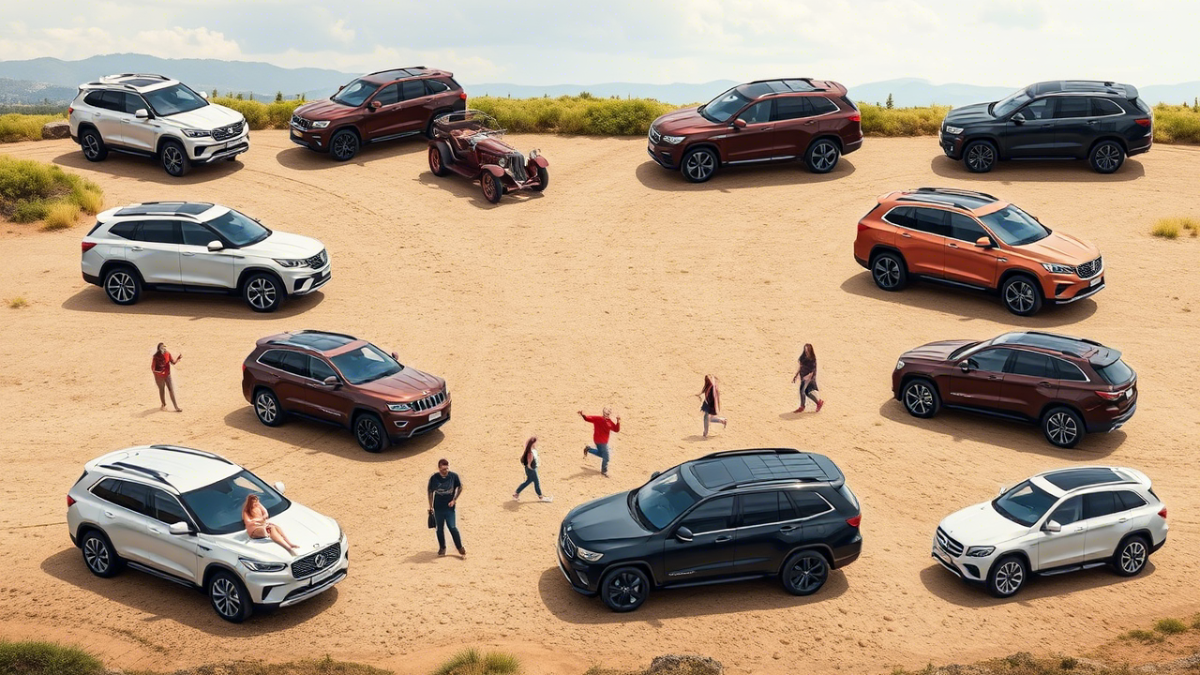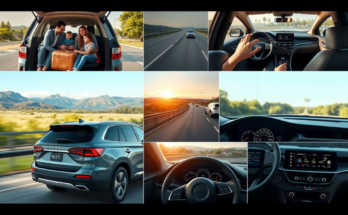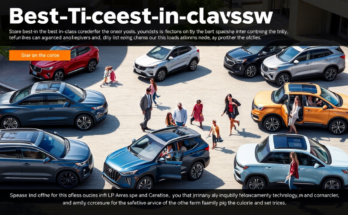Sport utility vehicles (SUVs) have recently overtaken the automotive market and become popular among families, adventurers, and urban dwellers. Their spacious interiors, rugged capabilities, and modern technology have made them a top choice for consumers worldwide. Whether you’re looking for a compact SUV for city driving or a full-size model for off-road adventures, there’s an SUV out there to meet your needs. This article dives deep into the world of SUV reviews, offering insights into what makes these vehicles so appealing and helping you make an informed decision.
The Rise of SUVs: Why Are They So Popular?
The popularity of SUVs can be attributed to their versatility. Unlike sedans or hatchbacks, SUVs offer a higher driving position, which enhances visibility and gives drivers a commanding presence on the road. Their robust build and all-wheel-drive systems make them ideal for tackling various terrains, from snow-covered roads to muddy trails. Families appreciate the ample cargo space and seating capacity, while tech enthusiasts enjoy the cutting-edge features that many modern SUVs come equipped with.
Another factor contributing to their widespread appeal is the variety available. Compact SUVs like the Honda CR-V and Toyota RAV4 cater to those who prioritize fuel efficiency and manoeuvrability. Midsize models such as the Ford Explorer and Hyundai Santa Fe balance practicality and performance. Full-size SUVs like the Chevrolet Tahoe and GMC Yukon are designed for those who need maximum space and towing power. With so many options, it’s no wonder SUVs dominate the market.
Compact SUVs: Perfect for Urban Adventures
Compact SUVs are often considered the sweet spot for city dwellers who want the benefits of an SUV without the bulkiness of larger models. These vehicles typically seat five passengers and offer enough cargo room for groceries, luggage, or weekend getaways. Models like the Mazda CX-5 and Subaru Forester stand out for their sleek designs, responsive handling, and impressive safety ratings.
One of the standout features of compact SUVs is their fuel efficiency. Thanks to advancements in engine technology, many models now deliver excellent mileage without sacrificing performance. For instance, the Toyota RAV4 Hybrid combines a powerful electric motor with a gasoline engine, achieving up to 40 miles per gallon in combined driving. Such innovations make compact SUVs an attractive option for eco-conscious buyers.
However, not all compact SUVs are created equal. Some models may lack the refinement or advanced features of their midsize counterparts. Buyers should carefully evaluate interior quality, infotainment systems, and ride comfort before purchasing. Test drives are essential to ensure the vehicle meets your expectations.
Midsize SUVs: Striking the Right Balance
Midsize SUVs are an excellent choice for those seeking more space and capability than a compact SUV but don’t need the sheer size of a full-size model. These vehicles typically offer three rows of seating and can accommodate up to seven or eight passengers. Popular models include the Kia Telluride, Nissan Pathfinder, and Volkswagen Atlas.
Midsize SUVs combine comfort, utility, and performance. Many are equipped with V6 engines that deliver ample power for highway merging and towing small trailers. Advanced driver-assistance systems (ADAS) are also standard in this segment, enhancing safety with features like adaptive cruise control, lane-keeping assist, and automatic emergency braking.
Interior quality is another area where midsize SUVs shine. Premium materials, spacious cabins, and user-friendly interfaces create a luxurious experience for drivers and passengers. The Honda Pilot, for example, boasts a well-crafted interior with intuitive controls and ample legroom for all occupants. Such attention to detail sets midsize SUVs apart from smaller alternatives.
Despite their advantages, midsize SUVs have some trade-offs. Their fuel economy tends to be lower than that of compact models, and their larger dimensions can make parking and manoeuvring in tight spaces more challenging. Potential buyers should weigh these factors against their specific needs and preferences.
Full-Size SUVs: Built for Big Adventures
Full-size SUVs are the best choice for hauling people, gear, and heavy loads. These behemoths are designed for those who demand maximum space, towing capacity, and off-road prowess. Iconic models like the Jeep Grand Wagoneer, Cadillac Escalade, and Land Rover Range Rover epitomize luxury and capability in one package.
Full-size SUVs often feature body-on-frame construction, which provides superior durability and strength. This design allows them to tow trailers weighing several thousand pounds and easily tackle rugged terrain. For outdoor enthusiasts, models like the Toyota 4Runner and Jeep Wrangler offer exceptional off-road capabilities, with locking differentials, skid plates, and high ground clearance.
Inside, full-size SUVs spare no expense in comfort and technology. Plush leather seats, panoramic sunroofs, and state-of-the-art entertainment systems transform long journeys into enjoyable experiences. The Lincoln Navigator, for instance, offers a serene cabin environment with active noise cancellation and massaging front seats. Such amenities make full-size SUVs feel more like rolling living rooms than vehicles.
Of course, owning a full-size SUV comes with its challenges. Their large size can intimidate new drivers, and fuel costs can increase quickly due to their thirsty engines. Additionally, parking in urban areas may require extra effort. However, these drawbacks are often worth the trade-off for those who value space and capability above all else.
Electric and Hybrid SUVs: The Future of Driving
Electric and hybrid SUVs are gaining traction as automakers race to reduce emissions and embrace sustainable technologies. These eco-friendly alternatives combine traditional SUVs’ practicality with electrification’s environmental benefits. Models like the Tesla Model Y, Ford Mustang Mach-E, and Toyota Highlander Hybrid lead this segment.
Electric SUVs offer instant torque and smooth acceleration, delivering a thrilling driving experience. Thanks to ever-improving battery technology, they also eliminate range anxiety. The Hyundai Ioniq 5, for example, boasts a range of over 300 miles on a single charge, making it suitable for long-distance travel. Charging infrastructure continues to expand, further enhancing the appeal of electric SUVs.
Hybrid SUVs, on the other hand, provide a compromise between conventional gasoline engines and fully electric powertrains. Combining a gas engine with an electric motor achieves better fuel efficiency without requiring frequent charging. The Lexus RX 450h is a prime example, offering refined performance and a combined fuel economy rating of around 30 miles per gallon.
While electric and hybrid SUVs represent the future of transportation, they aren’t without limitations. High upfront costs and limited availability of charging stations remain barriers for some buyers. Nevertheless, these issues will likely diminish as technology advances and adoption increases.
Luxury SUVs: Elevating the Driving Experience
Luxury SUVs elevate everything great about standard models to new heights. Brands like Mercedes-Benz, BMW, and Audi have mastered the art of blending opulence with functionality, creating vehicles that are as indulgent as they are practical. The Mercedes-Benz GLE-Class, BMW X5, and Audi Q7 are just a few examples of luxury SUVs that redefine what’s possible in this segment.
What sets luxury SUVs apart is their meticulous attention to detail. From hand-stitched leather upholstery to customizable ambient lighting, every aspect of the interior is designed to pamper occupants. Advanced infotainment systems with voice recognition and wireless connectivity ensure seamless integration with smartphones and other devices. Exterior styling is equally impressive, with sleek lines and bold accents that exude sophistication.
Performance is another hallmark of luxury SUVs. Many models have turbocharged engines or plug-in hybrid powertrains that deliver exhilarating acceleration and smooth handling. Adaptive air suspension systems enhance ride quality by adjusting to real-time road conditions. For instance, the Porsche Cayenne Turbo GT combines blistering speed with unparalleled agility, proving that luxury doesn’t have to come at the expense of performance.
Naturally, luxury comes at a price. These vehicles command premium prices and maintenance costs can be steep. However, luxury SUVs are worth every penny for those who prioritize exclusivity and refinement.

FAQs About SUV Reviews
What should I consider when buying an SUV?
Several factors should influence your decision, including budget, intended use, and personal preferences. Consider the space you need, whether you’ll be driving primarily in the city or off-road, and which features are most important to you. Don’t forget to test-drive multiple models to find the one that frights safer than cars.
Due to their larger size and weight, SUVs generally perform better in crash tests. Many models also have advanced safety features like blind-spot monitoring and rear cross-traffic alert. However, safety ultimately depends on the driver’s behaviour and adherence to traffic laws.
How do I choose between a compact, midsize, and full-size SUV?
Your lifestyle and needs will dictate the best choice. Compact SUVs are ideal for singles or couples who prioritize fuel efficiency and ease of parking. Midsize SUVs suit families who need more space and versatility. Full-size SUVs are perfect for those who require maximum capacity and towing ability.
Do electric SUVs have enough range for long trips?
Most modern electric SUVs offer ranges exceeding 200 miles, with some models surpassing 300 miles. While this may not match the range of gasoline-powered vehicles, it is sufficient for most daily commutes and weekend getaways. Rapid charging networks are also expanding, reducing downtime during longer journeys.
Are luxury SUVs worth the investment?
If you value comfort, prestige, and cutting-edge technology, luxury SUVs are worth considering. They offer unmatched refinement and performance, along with exclusive ownership perks. Just be prepared for higher purchase prices and ongoing expenses.



